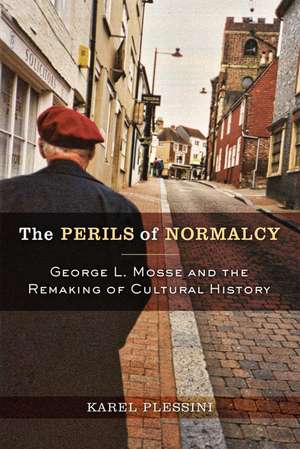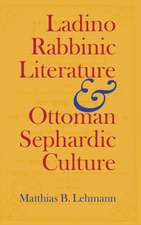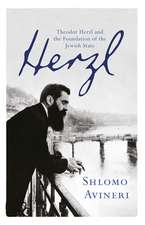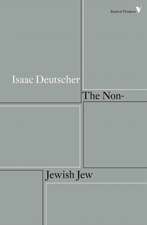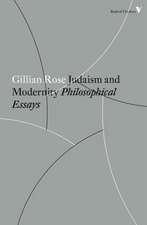The Perils of Normalcy: George L. Mosse and the Remaking of Cultural History: George L. Mosse Series in the History of European Culture, Sexuality, and Ideas
Autor Karel Plessinien Limba Engleză Paperback – 23 feb 2014
In this intellectual biography of George Mosse, Karel Plessini draws on all of Mosse's published and unpublished work to illuminate the origins and development of his groundbreaking methods of historical analysis and the close link between his life and work. He redefined the understanding of modern mass society and politics, masterfully revealing the powerful influence of conformity and political liturgies on twentieth-century history. Mosse warned against the dangers inherent in acquiescence, showing how identity creation and ideological fervor can climax in intolerance and mass murder—a message of continuing relevance.
Din seria George L. Mosse Series in the History of European Culture, Sexuality, and Ideas
-
 Preț: 119.08 lei
Preț: 119.08 lei -
 Preț: 166.01 lei
Preț: 166.01 lei -
 Preț: 338.36 lei
Preț: 338.36 lei -
 Preț: 144.97 lei
Preț: 144.97 lei -
 Preț: 143.79 lei
Preț: 143.79 lei - 19%
 Preț: 433.43 lei
Preț: 433.43 lei - 19%
 Preț: 437.17 lei
Preț: 437.17 lei -
 Preț: 264.90 lei
Preț: 264.90 lei -
 Preț: 297.44 lei
Preț: 297.44 lei -
 Preț: 282.91 lei
Preț: 282.91 lei -
 Preț: 154.26 lei
Preț: 154.26 lei -
 Preț: 246.19 lei
Preț: 246.19 lei -
 Preț: 231.53 lei
Preț: 231.53 lei -
 Preț: 250.82 lei
Preț: 250.82 lei -
 Preț: 246.19 lei
Preț: 246.19 lei -
 Preț: 306.34 lei
Preț: 306.34 lei -
 Preț: 131.04 lei
Preț: 131.04 lei -
 Preț: 279.45 lei
Preț: 279.45 lei -
 Preț: 181.22 lei
Preț: 181.22 lei -
 Preț: 189.96 lei
Preț: 189.96 lei -
 Preț: 251.23 lei
Preț: 251.23 lei -
 Preț: 188.60 lei
Preț: 188.60 lei -
 Preț: 315.95 lei
Preț: 315.95 lei - 23%
 Preț: 475.36 lei
Preț: 475.36 lei -
 Preț: 314.03 lei
Preț: 314.03 lei - 23%
 Preț: 482.44 lei
Preț: 482.44 lei - 8%
 Preț: 462.20 lei
Preț: 462.20 lei - 23%
 Preț: 482.60 lei
Preț: 482.60 lei -

Preț: 305.90 lei
Nou
Puncte Express: 459
Preț estimativ în valută:
58.55€ • 63.62$ • 49.22£
58.55€ • 63.62$ • 49.22£
Carte tipărită la comandă
Livrare economică 21 aprilie-05 mai
Preluare comenzi: 021 569.72.76
Specificații
ISBN-13: 9780299296346
ISBN-10: 0299296342
Pagini: 296
Dimensiuni: 152 x 229 x 20 mm
Greutate: 0.41 kg
Ediția:1
Editura: University of Wisconsin Press
Colecția University of Wisconsin Press
Seria George L. Mosse Series in the History of European Culture, Sexuality, and Ideas
ISBN-10: 0299296342
Pagini: 296
Dimensiuni: 152 x 229 x 20 mm
Greutate: 0.41 kg
Ediția:1
Editura: University of Wisconsin Press
Colecția University of Wisconsin Press
Seria George L. Mosse Series in the History of European Culture, Sexuality, and Ideas
Recenzii
"A perceptive new analysis that encompasses the broad range of Mosse's work. The most thorough study on the historian that has been done."—Stanley G. Payne, Series Editor
“Mosse continuously reflected on the difficulties of acting ethically in a world of power politics. . . . Plessini compellingly shows how the dialectics of ethics and realism played out in Mosse’s writings in multiple variations over the decades.”—American Historical Review
Notă biografică
Karel Plessini has been a fellow of the Institut für Europäische Geschichte in Mainz, Germany, and a George L. Mosse Visiting Scholar at the University of Wisconsin–Madison.
Cuprins
Acknowledgments
Introduction: The Serpent and the Dove
The "Eternal Emigrant"
Why an Intellectual Biography of George L. Mosse?
The Link between Life and Work
Machiavellism and the Holocaust
The Great Provocateur
Chapter 1. From Machiavellism to Totalitarianism
Political Concerns
Thomas Hobbes as the "Voice of the Future"
The Serpent and the Dove: The Question of Political Morality
From Machiavellism to National Socialism
Chapter 2. Beyond the History of Intellectuals
From Ideas to Ideologies: The Turn to Popular Culture
Between Consensus, Nihilism, and Propaganda
From Nihilism to Liturgy: The Religion of Fascism
Beyond the History of Intellectuals
Chapter 3. The Roots of the Anthropological and Visual Turn
The Anthropological Turn: Myth
Anthropology and Mass Movements
Between Rationalism and Irrationality
History and Psychology: Rationalizations, Motivations, Perceptions
Anthropology and Historicism
The Visual Turn: Aesthetics and Architecture
Toward New Perspectives
Chapter 4. The Dark Side of Modernity
The "Failure of the Enlightenment"
Nationalism, Racism, and Respectability
Modernity and the Great War
Chapter 5. From Machiavellism to the Holocaust
Nihilism and the Holocaust
Respectability and the Holocaust
Reconsidering the "Ideal Bourgeois"
Chapter 6. The Missing Link: The Nationalist Revolution
The Fear of Ideology
The Building Blocks of a General Theory: Fascism as Revolution
The Missing Link: Fascism as a Nationalist Revolution
The World through the Eyes of Its Faiths
Chapter 7. The "True Mission of Judaism"
George Mosse, Zionism, and the Reality of Israel
A Heritage Rediscovered: Redemption by Judaism
Between Nationalism and Patriotism
The "True Mission of Judaism"
Chapter 8. The Granitic Foundation of a Faith
The Meaning of History
The Devil's Advocate
The "History of Perceptions"
Conclusion: George L. Mosse's Legacy
Mosse's Work between Recognition and Neglect
Mosse as Émigré Historian
The Message of a Life
Notes
IndexDescriere
A taboo-breaker and a great provocateur, George L. Mosse (1918–99) was one of the great historians of the twentieth century, forging a new historiography of culture that included brilliant insights about the roles of nationalism, fascism, racism, and sexuality. Jewish, gay, and a member of a culturally elite family in Germany, Mosse came of age as the Nazis came to power, before escaping as a teenager to England and America. Mosse was innovative and interdisciplinary as a scholar, and he shattered in his groundbreaking books prevalent assumptions about the nature of National Socialism and the Holocaust. He audaciously drew a link from bourgeois respectability and the ideology of the Enlightenment—the very core of modern Western civilization—to the extermination of the European Jews.
In this intellectual biography of George Mosse, Karel Plessini draws on all of Mosse's published and unpublished work to illuminate the origins and development of his groundbreaking methods of historical analysis and the close link between his life and work. He redefined the understanding of modern mass society and politics, masterfully revealing the powerful influence of conformity and political liturgies on twentieth-century history. Mosse warned against the dangers inherent in acquiescence, showing how identity creation and ideological fervor can climax in intolerance and mass murder—a message of continuing relevance.
